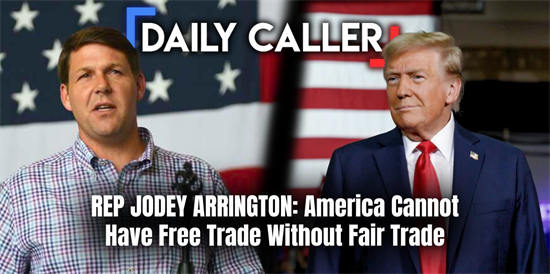In the News
REP JODEY ARRINGTON: America Cannot Have Free Trade Without Fair Trade
Washington,
May 8, 2025
Critics of President Trump’s reciprocal trade policy have argued it is either too disruptive or an all-out affront on free trade. The reality is, there is no free trade without fair trade, and there’s no way to reverse thirty years of unfair trade without disruption. Decades of failed trade policy have created an unlevel playing field for American manufacturers and producers – including my farmers and ranchers in West Texas. Worst of all, it has jeopardized our entire country’s economic and national security. Thankfully, we have a President who understands the gravity of this existential threat and is willing to exert the political courage to address it head-on.
REP JODEY ARRINGTON: America Cannot Have Free Trade Without Fair TradeBy Rep. Jodey ArringtonMay 8, 2025 AS SEEN IN THE DAILY CALLER Critics of President Trump’s reciprocal trade policy have argued it is either too disruptive or an all-out affront on free trade. The reality is, there is no free trade without fair trade, and there’s no way to reverse thirty years of unfair trade without disruption. Decades of failed trade policy have created an unlevel playing field for American manufacturers and producers – including my farmers and ranchers in West Texas. Worst of all, it has jeopardized our entire country’s economic and national security. Thankfully, we have a President who understands the gravity of this existential threat and is willing to exert the political courage to address it head-on. Prior to President Trump announcing his reciprocal tariffs, the world’s twenty largest economies had an average tariff rate double that of the United States. These are not nations in need of tariff protection to develop nascent industries. They are major economies like the European Union, Brazil, and China. Even worse, their average agricultural tariff was triple the rate of the United States – and that doesn’t account for the additional layers of non-tariff barriers that impede our exports, like overly restrictive regulations, import quotas, and preferences for state-owned enterprises. As a result, our agricultural trade deficit topped $32 billion in 2024, the highest in American history. This unfair treatment has led to artificially low demand for U.S. commodities, unrealized income for our manufacturers, and suppressed wages for our workers. How can our farmers and ranchers compete on a level playing field when India imposes a 50% tariff on our sorghum, Vietnam imposes a 30% tariff on our beef, and economies like the European Union and Mexico restrict our cotton exports with prohibitive regulations? How can our country have a thriving industrial base when our decision to reward China’s bad behavior by normalizing trade relations with them in 2000 – at the altar of importing cheaper goods – sacrificed five million manufacturing jobs? We are long overdue for a leader who demands adherence to this basic principle of fairness from our global trading partners and is willing to leverage the U.S. market in order to achieve reciprocal trade. Beyond economic concerns, President Trump’s bold actions are informed by a national security imperative – ending our dependence on foreign adversaries. A recent study found that China now leads the U.S. in the development and control of 37 out of 44 critical cutting-edge technologies. As Treasury Secretary Scott Bessent recently noted, the shortages we faced during COVID – personal protective equipment, medicine, and more – served as a humbling “beta test” for how unprepared we are for a conflict with a large foreign adversary. It is both irresponsible and dangerous to continue our reliance on rivals like China for resources essential to public safety and national security. President Trump has been transparent about the fact that there may be short-term discomfort as we reset these structural imbalances and achieve reciprocal trade. If past is prologue, we will soon find ourselves with better deals, more consumer choices, and a stronger economy. Trade agreements negotiated in Trump’s first term were largely responsible for a 26% increase in overall American exports and a 24% increase in U.S. agricultural exports. This contributed to a roaring pre-COVID economy as unemployment reached historic lows, real household incomes rose, and inflation was effectively non-existent. And signs of the harvest are already here. Since President Trump’s reciprocal tariff announcement on “Liberation Day,” 70 countries have already come to the table to lower their trade barriers. This list includes historically bad trade actors such as India, Vietnam, Argentina, and Japan. President Trump has also already secured over $5 trillion in new investments over his first 100 days in office which will create hundreds of thousands of new jobs. We have a historic opportunity to finally fix the global trade imbalance, which has punished our producers and manufacturers for decades and will eventually lead to Americans being dangerously dependent on our adversaries for everything from computer chips, to food and drugs, to other critical supplies. We must meet this moment with the urgency it demands. We must rally behind President Trump and show the world we are unified and unwavering in our commitment to fair trade. This may be the last opportunity to right the ship on reciprocal trade before it sinks – along with our economy, security, and global leadership. The best time to do this was thirty years ago – or today!
|



